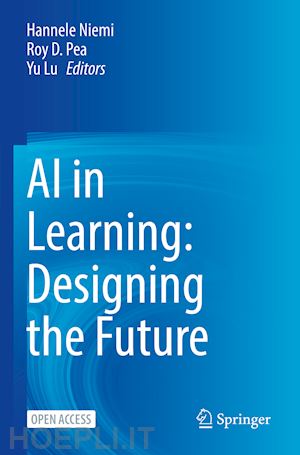

Questo prodotto usufruisce delle SPEDIZIONI GRATIS
selezionando l'opzione Corriere Veloce in fase di ordine.
Pagabile anche con Carta della cultura giovani e del merito, 18App Bonus Cultura e Carta del Docente
AI (Artificial Intelligence) is predicted to radically change teaching and learning in both schools and industry causing radical disruption of work. AI can support well-being initiatives and lifelong learning but educational institutions and companies need to take the changing technology into account. Moving towards AI supported by digital tools requires a dramatic shift in the concept of learning, expertise and the businesses built off of it.
Based on the latest research on AI and how it is changing learning and education, this book will focus on the enormous opportunities to expand educational settings with AI for learning in and beyond the traditional classroom. This open access book also introduces ethical challenges related to learning and education, while connecting human learning and machine learning. This book will be of use to a variety of readers, including researchers, AI users, companies and policy makers.1.Introduction to AI in Learning – Designing the Future.- Part I: AI expanding learning and wellbeing throughout life.- 2.Artificial Intelligence Innovations for Multimodal Learning, Interfaces, and Analytics.- 3.Curiosity and Interactive Learning in Artificial Systems.- 4.Assessing and Tracking Students’ Wellbeing through an Automated Scoring System: Schoolday Wellbeing Model.- 5.Learning from Intelligent Social Agents as Social and Intellectual Mirrors.- 6.An AI-Powered Teacher Assistant for Student Problem Behavior Diagnosis.- 7.Analysis and Improvement of Classroom Teaching Based on Artificial Intelligence.- Part II. AI in Games and Simulations.- 8.Perspectives and Metaphors of Learning: A Commentary on James Lester’s Narrative-centered AI-based Environments.- 9.Learning Career Knowledge: Can AI Simulation and Machine Learning Improve Career Plans and Educational Expectations?.- 10.Learning clinical reasoning through gaming in nursing education – Future scenarios of game metrics and AI.- 11.AI-Supported Simulation-Based Learning: Learners’ Emotional Experiences and Self-Regulation in Challenging Situations.- Part III. AI Technologies for education and Intelligent Tutoring Systems.- 12.Training Hard Skills in Virtual Reality: Developing a Theoretical Framework for AI-based Immersive Learning.-13.Multiple users’ experiences of an AI-aided educational platform for teaching and learning. 14.Deep Learning in Automatic Math Word Problem Solvers. 15.Recent Advances in Intelligent Textbooks for Better Learning.- Part IV. AI and Ethical Challenges in New Learning Environments.- 16.Ethical Guidelines for Artificial Intelligence-based Learning: A Transnational Study between in China and Finland.- 17.Artificial Intelligence Ethics from the Perspective of Educational Technology Companies and Schools.- 18.Artificial Intelligence in Education as a Rawlsian Massively Multiplayer Game: A thought experiment on AI Ethics.- 19.Four surveillance technologies creating challenges for education.- 20.Reflections on the contributions and future scenarios in AI-based learning.
Roy Pea is David Jacks Professor of Education & Learning Sciences at Stanford University, School of Education, and Computer Science (Courtesy), and Director of the H-STAR Institute. His studies and publications in the learning sciences focus on advancing theories, research, tools and social practices of technology-enhanced learning of complex domains, including his role as Co-Director and Co-PI of the NSF-funded LIFE Center, which seeks to develop and test principles about the social foundations of human learning in informal and formal environments with the goal of enhancing human learning from infancy to adulthood. He is also founder and Director of Stanford’s PhD program in Learning Sciences and Technology Design. He is co-author of the 2010 National Education Technology Plan for the US Department of Education, co-editor of Video Research in the Learning Sciences (2007), and co-author of the National Academy of Sciences book: How People Learn (2000). He is a Fellow of the National Academy of Education, Association for Psychological Science, the American Educational Research Association, and the Center for Advanced Study in the Behavioral Sciences. In 2004-2005, Roy was President of the International Society for the Learning Sciences. Roy served from 1999-2009 as a Director for Teachscape, a teacher professional development services company he co-founded with CEO Mark Atkinson.
Lu Yu received the Ph.D. degree from National University of Singapore in computer engineering, and B.S./M.S. degrees from Beijing University of Aeronautics and Astronautics (Beihang University). He is currently an Associate Professor with the School of Educational Technology, Faculty of Education, Beijing Normal University (BNU), where he also serves as the director of the artificial intelligence lab at the advanced innovation center for future education (AICFE). He has published more than 40 academic papers in the prestigious journals and conferences (e.g., IEEE TKDE, TMC, ICDM, AIED, CIKM, EDBT, IJCAI, ICDE), and currently serves as the PC member for multiple international conferences (e.g., AAAI, AIED, CIKM). Before joining BNU, he was a research scientist and principle investigator at the Institute for Infocomm Research (I2R), A*STAR, Singapore. His research interests are Learner Modeling, Robotics for Education, Intelligent Tutoring System, Educational Data Mining, Data Analytics and Ubiquitous Computing











Il sito utilizza cookie ed altri strumenti di tracciamento che raccolgono informazioni dal dispositivo dell’utente. Oltre ai cookie tecnici ed analitici aggregati, strettamente necessari per il funzionamento di questo sito web, previo consenso dell’utente possono essere installati cookie di profilazione e marketing e cookie dei social media. Cliccando su “Accetto tutti i cookie” saranno attivate tutte le categorie di cookie. Per accettare solo deterninate categorie di cookie, cliccare invece su “Impostazioni cookie”. Chiudendo il banner o continuando a navigare saranno installati solo cookie tecnici. Per maggiori dettagli, consultare la Cookie Policy.